(Diamond Nation.com sat down with former Rutgers All-American shortstop Darren Fenster recently and picked his highly developed baseball brain for clues that reveal a rising star in the game. Fenster is beginning his ninth season with the Boston Red Sox organization, serving in his second year as the organization’s Minor League Outfield/Baserunning Coordinator).
By Bob Behre
Darren Fenster so immersed himself in the game of baseball, even at a very young age, the adults around him knew they could trust him to do the right thing.
“Darren was way above his grade level in his knowledge of the game,” said Steve Antonucci, who coached Fenster and Middletown South High School to the NJSIAA Group 4 championship in 1996. “He made it fun to coach. You could bounce ideas off Darren. He was fully engaged. He knew all the intricacies of the game.”
Antonucci, also his school’s highly successful football coach the past 22 years, recognizes talent when he sees it, but he also knows when a player brings something else to the table that is unteachable.
“Darren was a tremendous player but, more importantly, he had a great work ethic,” said Antonucci. “He was a great leader and absolutely loved the game. He ate, drank and slept baseball. That’s what got him where he is today.”
Fenster, who was built more like a lightweight wrestler than a baseball player during his high school days, nonetheless would prove very quickly he could compete at a very high level.
“I definitely appreciate what he’s been able to achieve,” said Antonucci. “I was 165 pounds in high school, so I get it. We play with big chips on our shoulders. It’s a great motivator.” Fenster has defied the odds on athletic fields since he was a little boy. In fact, the word “little” kind of followed him around for quite some time.
Veteran high school sports reporter Gregg Lerner was responsible for covering Monmouth County baseball for much of his career at The Star-Ledger and remembers Fenster well.
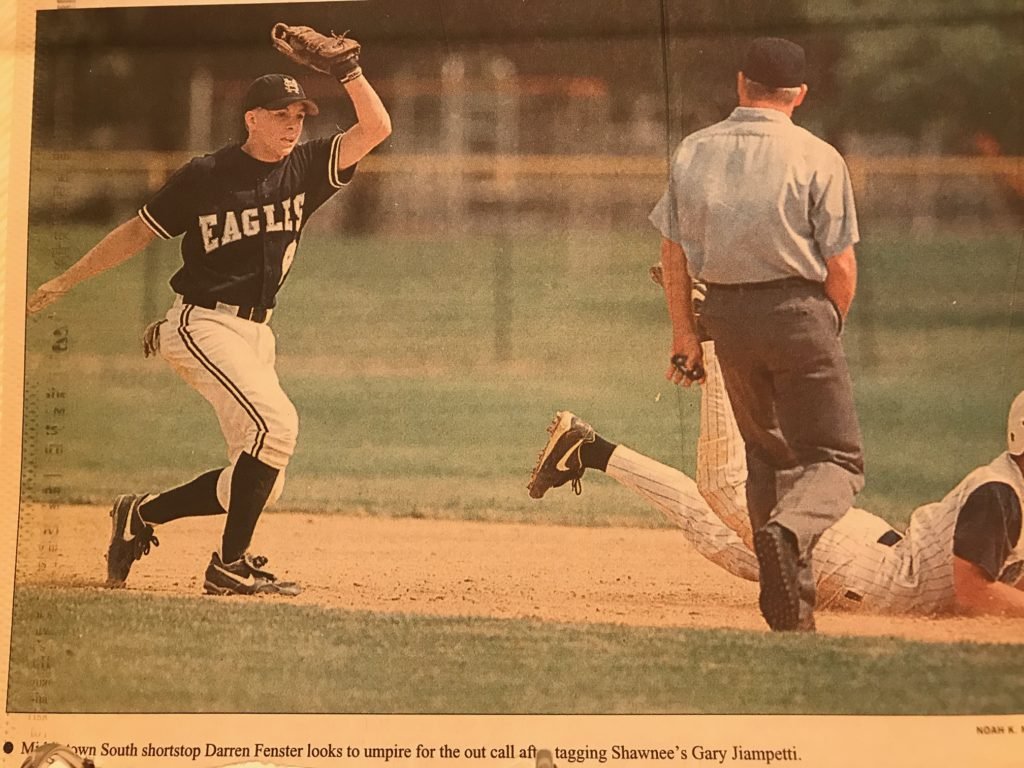
“Darren was a grinder and a leader whose impressive stats never broached his importance to the overall product at Middletown South,” said Lerner. “He played the game the right way. He was defensively sound, immeasurably intelligent and the kind of hustler who inspired his teammates to follow his lead.”
The “little” reference, by the way, pointed only to Fenster’s physical stature, the one thing in this baseball junky’s life he could not control. Fenster’s game would prove to be so big in every other way, he’d become an unstoppable baseball dynamo, a player easy to root for and, soon, a coach we’d be eager to hear from.
Scarlet Knight for life
“I remember recruiting Darren,” said former Rutgers assistant coach Glen Gardner. “He was a smaller guy. I’m sure he was told what he couldn’t do most of his life. He just did it and did it really well. We knew he could play defense with anyone and his bat was coming.”
Gardner remembers the freshman Fenster as not more than 140 pounds.
“Darren had a nice little ride at Rutgers,” said Gardner. “He came to us as a freshman and wasn’t very big or strong. He barely hit at all the first half of the season but ended up hitting .310 that year.”
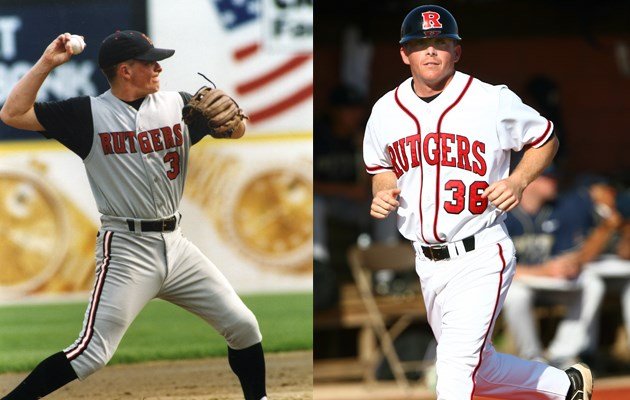
Fenster, all of 5-9 and perhaps 160 pounds by his senior year, would put together one of the truly remarkable college baseball careers at Rutgers. He earned All-American honors his junior and senior seasons and helped spearhead the Scarlet Knights to Big East Conference championships in 1998 and 2000. Fenster’s outstanding senior campaign — he batted .433, earned Big East Player of the Year and a consensus First Team All-American selection — would make him a finalist for the Dick Howser Trophy, awarded to the top collegiate baseball player in the nation.
He still owns Rutgers all-time records for career hits (355), doubles (65) and at bats (818). His 101 hits in the 2000 season remains a Scarlet Knights record. Rutgers posted its first 40-win season in 2000 when it was ranked as high as No. 14 nationally. Fenster was MVP on that team, which boasted three future Major Leaguers and a first round draft choice. Fenster was drafted that June in the 12th round by the Kansas City Royals.
“Darren was such a good teammate and he made everyone around him better,” said Gardner. “Our second baseman became better because of Darren’s play at shortstop. I was talking to Todd Frazier today. We talked about intangibles. Darren had quite a few of those. What a brain. He knew what to do more than most people.”
Fenster and Hill, two-of-a kind
Gardner gave a little insight into Fenster’s relationship with then-Rutgers coach Fred Hill.
“Coach Hill always loved Darren,” said Gardner. “He appreciated him. Coach Hill wasn’t the tallest man either. They are very similar people. Coach Hill took to Darren right away. I think there was a connection, with coach Hill thinking, this kid is going through the same things I went through.”
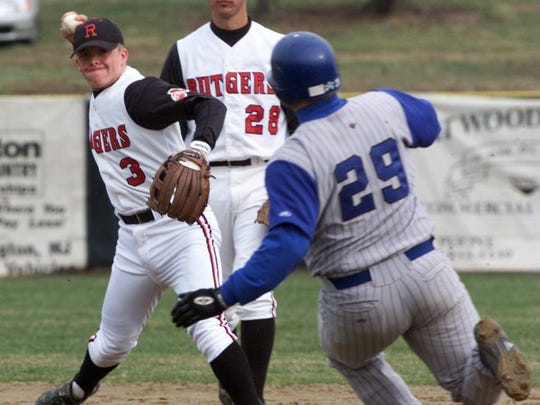
Fenster choosing Rutgers was more happenstance than romance.
“How I got to Rutgers in the first place was a pretty crazy experience,” said Fenster. “Like everyone else in the northeast, I wanted to play down south. I had some interest, more on my end, in North Carolina, Virginia and Tulane. They were my top three. My older brother had gone to Virginia, so I was familiar with the university. This was before Virginia was Virginia. UNC was not the UNC it is right now. Tulane was probably the best of the three.
“The recruiting game was completely different then. I had gone most of my senior year without being recruited. The spring of my senior year I went on a visit to Rutgers and I felt a huge amount of pressure to get this figured out. The other schools couldn’t commit to me yet. I didn’t want to leave that on my plate, so I said, let me go to Rutgers. I knew very little about coach Hill and very little about the program. Part of my driving force was realizing my mom and dad had gone to 90 percent of my sporting events. I knew they’d be able to see my play. Everything I’m doing in life right now was set in motion because of that decision to attend Rutgers.”
Rutgers’ and Hill’s lessons would carry Fenster through a successful minor league experience.
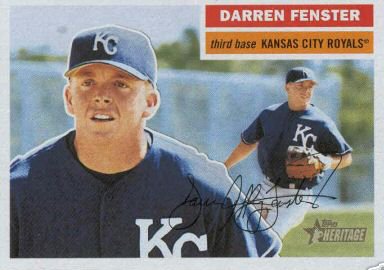
Fenster had perhaps his best season of professional ball in 2004, batting .304 with 126 hits and a .405 on-base percentage in 114 games. He had played well enough to be invited to major league camp the following spring. But career tragedy struck that spring when Fenster tore his ACL in camp, effectively ending the 2005 season before it started. He was delivered the final crushing blow on April 1, 2006 when the Kansas City Royals released him. Little did Fenster know, his baseball journey was truly just beginning.
Career turning point
“Coach Hill was the first person I called after my parents,” said Fenster in recalling the conversation with his college mentor. “I was like, hey, what do I do with the rest of my life?” Fenster couldn’t have chosen a better source for that question.
“He asked me if I had any interest in coaching,” said Fenster. “At that point, I had no interest in anything.” Having the professional baseball rug pulled out from under your feet can have a debilitating effect on one’s equilibrium. “Coach Hill said, ‘I think you have a chance to be a pretty good coach. If it’s something that interests you, I’ll create a spot for you on my staff. If you like it, we’ll see where your career goes. If you don’t then you’ll get baseball out of your system.”
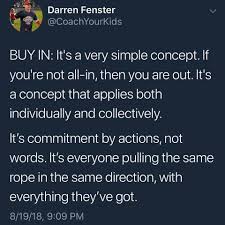
The name Fred Hill — who died last March at the age of 84 after a remarkable coaching career — would be a recurring thread running through the baseball life of Darren Fenster. “That initial experience of working with coach Hill and that group of Rutgers players really is the foundation for everything I’ve been able to do as a coach,” he said. No, Fenster would never get baseball out of his system
Fast-forward 14 years and we find Fenster working to help shape talented young minor league ballplayers into major leaguers. Fenster is beginning his second season as the Red Sox’s Minor League Outfield/Baserunning Coordinator. And it appears the position was made so he would liberally tap a seemingly bottomless well of baseball knowledge. The shaping of Darren Fenster the coach, however, would begin in Piscataway, N.J. under the able tutelage of Fred Hill
“I kinda’ jumped into it,” said Fenster of his early days back at his alma mater. “The group that was at Rutgers at that time was headlined by Todd Frazier. I used to come back and work out there in the offseason, so I had some relationships with the players.”
Hill actually created the position of Director of Baseball Operations and simply placed Fenster into the role. “The job didn’t exist until coach Hill created it for me,” said Fenster. “I felt I could help those guys from the experience I had in professional ball. And I was able to learn every aspect of what it took to run a college program.” Working closely with Hill at Rutgers for six seasons, Fenster certainly could see himself, when the time was right, following his mentor into the Scarlet Knights’ head coaching position.
During his six-year stint on the Rutgers staff, Fenster began to absorb every morsel of information he could from Hill, his fellow coaches and his experiences coaching players. That thirst for knowledge would put Fenster in front of some impressive baseball people and lead to a further widening of his career horizons. In the winter of 2008, he ventured to the American Baseball Coaches Association Convention in Philadelphia where he was introduced to Kelly Nicholson, a coach in the Cape Cod League. Nicholson was so impressed with Fenster in their short intro, he would later offer him a job on his coaching staff without an interview.
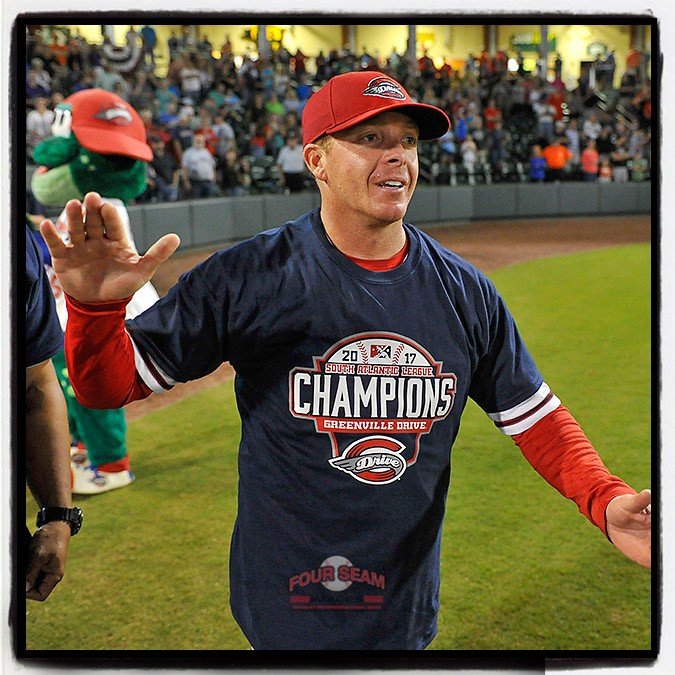
Putting on the Cape
“The opportunity to work with coach Hill was my biggest break in baseball,” said Fenster. “There was something that he saw in me before I was able to see it myself. Coaching in the Cape Cod League was probably my second biggest break because of Kelly Nicholson.”
Fenster had just interviewed with Cotuit coach Mike Roberts when a former minor league teammate introduced him to Nicholson.
“Darren was recommended to me by Scott Walter, who is a scout with the Orioles now,” said Nicholson. “Scott played for us at Loyola Marymount. He said, ‘If you are looking for a guy, I’ve got one.’ Well, Darren exceeded expectations.” Walter and Fenster had been teammates and roommates on their way up the Royals’ chain.
Fenster spent just one summer in the Cape with Nicholson, remarkably now in his 18th year as the manager of Orleans. Nicholson, however, didn’t hesitate to place Fenster in a major role with the team. “What we try to do at Orleans is hire really good people and just let them do the job,” said Nicholson. “That’s what I did with Darren and he did a fantastic job.”
The competition is real in the Cape Cod League and the talent level deep. Major league first baseman Mike Ford, for example, was signed as a free agent out of the Cape by the Yankees in 2013. Fenster would cut his teeth on the Cape as a coach in a true leadership role.
“That turned out to be the first coaching job where I had to think on my feet,” said Fenster. “It was what Kelly allowed me to do. He had me organize batting practice, write the lineup and coach third base. Those were three things I had never done before. He was such a great mentor in terms of he’d pick spots where he felt like I could use some direction. I will forever be in debt to him because that summer helped me understand how a game flows.”
By 2011, Fenster could see the writing on the Rutgers wall did not have his name as a future head coach in the program. He knew the time had come to take his coaching career to the next level.
Turning pro — again
“I thought, maybe I can get a job in pro ball,” said Fenster. “I started networking the summer of 2011. I talked to anyone who would listen that I was interested in getting into pro ball. The only thing I wouldn’t do was scout, because that was running me into the ground at Rutgers. It took five months of knocking down doors and having a lot of conversations. Everyone told me the toughest thing to do was to get your foot in the door.”

Fenster’s feet may not have been as much help to him as a coach as they were as a player, but his reputation and connections in the game would provide dividends.
“It just so happened, with the Red Sox, there were a ton of guys I had a relationship with,” said Fenster. “I played against Mike Hazen, the Red Sox director of player development at the time, when he was at Princeton.” Hazen is now the Diamondbacks general manager. “Allard Baird, who had been the Royals GM when I was there was now the Red Sox assistant GM. Scott Bradley, the Princeton coach, is one of my closest friends in the game. He put in a word for me. Former teammates like Steve Langone, Anthony Turco helped as did Ray Sagnant, now an area scout. They were able to get my resume in front of the powers that be.”
Fenster, with seemingly an army pulling for him, finally landed that interview with the Red Sox. He received a call from MLB’s Winter Meetings in December of 2011. “I had a phone interview with Ben Crockett and then went to Fenway a week later. The next day they offered me a job as the hitting instructor for the (Single-A) Greenville Drive.” Fenster, who had grown up a Yankees fan, suddenly found himself in, distinctively, red and navy blue.
“I’ll always remember that day because that was the day I stopped liking the Yankees and started loving the Red Sox.”
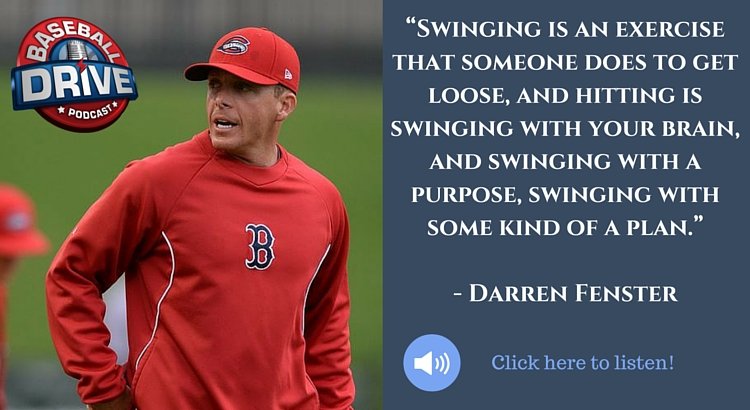
Crockett is now the Red Sox’s vice president/player development and, eight years later, recalls Fenster’s early days with the club. “It was clear from the start, Darren had great energy and was passionate about teaching,” said Crockett. “His experience in college was an asset. He was organized, detailed and had developed an excellent process.”
Current Red Sox third base coach Carlos Febles was Greenville’s manager in 2012. “He was great to work with,” said Fenster. “He helped shape me as a (future) manager.”
Courtesy of some managerial changes in the organization at the end of 2012, Fenster would find out quickly just how much he had learned about leading a team. He was offered the Red Sox’s Gulf Coast (Rookie) League manager’s job. “The field coordinator at the time, David Howard, asked me if I’d be interested in it,” he said. “It wasn’t even on my radar. I was just happy I had a hitting coach job. I really enjoyed being a hitting coach. He had to convince me a little bit to take the job. He gave me bigger-picture stuff.”
Fenster’s minor league managing picture grew brighter with his elevation to the Single-A Greenville manager’s position the following year. Four years into the Greenville job, Fenster’s 2017 Drive team won the South Atlantic League championship and Fenster was named the SAL’s Manager of the Year.
“I loved the aspect of being in more of a leadership position,” said Fenster. “It’s more big picture, teaching the game. I really loved the competitiveness of it. It brought that side of it back to me. I loved coaching third base, just being in the grind with a group of players for five months. I never had any inkling what lied ahead.”
Climbing the Red Sox ladder
What lied ahead in 2018 was a promotion to the Double-A Portland Sea Dogs. Fenster, who had followed Febles in the Greenville Drive job, replaced Febles in the Portland manager’s job as Febles continued up the Red Sox ladder to “The Show.”
One year at the Portland helm convinced the Red Sox higher-ups Fenster was ready for something bigger.
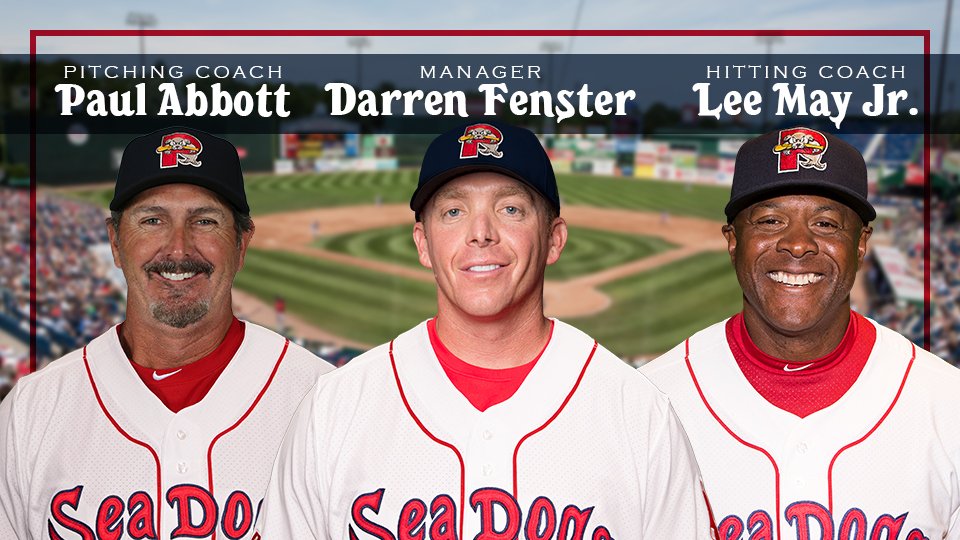
“When they offered me the outfield/baserunning coordinator job, I joked to my boss, ‘You do know I’m an infield guy, right?’” said Fenster. “‘I’ve always been very detailed on baserunning, so that was a good fit. They said, ‘Look we know the way you dive in with stuff and you know the basics of outfield play. You’ve been around the game long enough. We know you are going to dive in the way you dive into everything else.’”
Fenster was, again, learning what experienced baseball people saw in him. And that appeared to be a limitless ability to teach the game to young players. “The fact that they saw I could do this job without experience doing it, the fact that our field coordinator saw me as a manager before I had done it, and coach Hill saw my ability to coach before I had done it is amazing to me. I’ve been around a lot of forward thinking guys who saw a lot of potential in me. It’s allowed me to be forward thinking and see potential in guys, too. The coordinator job kind of got me out of my comfort zone and really helped round me out even more as a coach.”
What exactly does a minor league coordinator do? Simply put, “I am responsible for, in collaboration with a lot of other people, determining how we’re going to develop baserunners and outfielders so they become major league players,” said Fenster. “The coordinators are the guys who set the tone for the rest of the organization.”
Fenster is just a few weeks away from his second spring training as a minor league coordinator for the Red Sox and, over a ‘Boli sandwich at Stuff Yer Face in New Brunswick, he appeared to be chomping at the bit with the prospect of taking that deep dive into a new season.
“Spring training is where we get everybody on the same page,” said Fenster. “Everything is scripted. In a coordinator’s role, I’m responsible for what that block is for outfielders, what drills we are going to be doing, what staff I have and for what time, and what we are teaching during our baserunning block.
Fenster and his fellow coordinators are charged with responsibilities familiar to school teachers. They must teach in a creative way that engages their players. “When you bring energy and creativity, your players take to it pretty quickly. They should know when they come to you they’re going to be doing something different and there is going to be a purpose to it. To be able to do that, from our end, for six straight weeks from a creativity and organization standpoint is very challenging.”
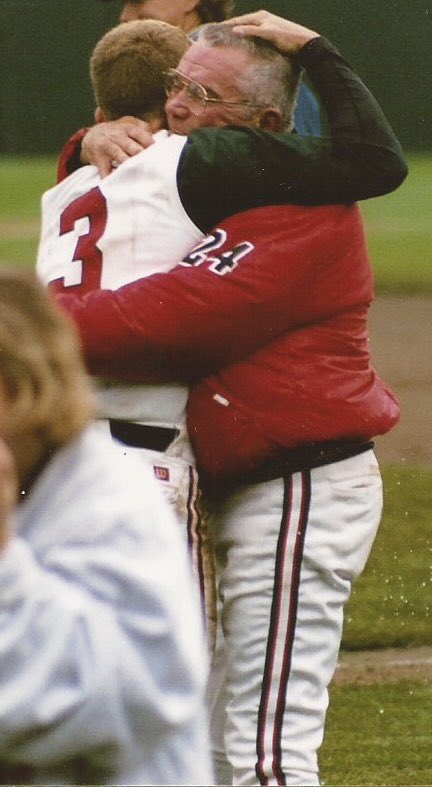
The other two critical segments of the baseball calendar for coordinators consist of the season itself and instructional league. “You get into the season and that foundation you set in spring training, it’s now the affiliates’ and coaching staff’s responsibility to build from that.” Fenster visits each affiliate every three or four weeks during the season. “I get a good snapshot of how everything is going through the course of the season. Then we set up the instructional league, which generally is for the young players we draft. It’s a crash course on finishing the year strong and it gives them a handful of focal points to work on in the offseason.”
The Educator
Fenster has had many titles attached to his name in the game of baseball; player, coach, manager and coordinator. “Educator” is the latest addition to his baseball resume, but truly one that was right there beside him all along. A month ago, USA Baseball named Fenster its “Baseball Coach Educator of the Year.”
“Fenster draws upon his professional baseball career as a player and coach to provide unique and insightful content for the ‘Sports Development Blog,’” read the USA Baseball press release in December. “Titled ‘Fundamental Skills,’ his contributions assist coaches, parents and leagues in developing young players and improving their experience within the game of baseball.”

Fenster says, “A few years ago, MLB introduced its Play Ball initiative, which was a big effort to get more kids playing baseball. One of the branches of Play Ball was creating an educational blog. It just so happened to work out that the timing was good and that I’ve always enjoyed writing. A year prior I had created my own blog. So, I reached out to USA Baseball.”
After reading some of Fenster’s blog entries, USA Baseball told him he, “had a unique skill and had the perspective of being in a number of different levels; college player and coach, professional player and coach, along with the ability to express things in a very simple form.” Fenster said, “They saw a window in Play Ball where they could attack the educational side of it and created what they called the Fundamental Skills Blog.”
Fenster has also written educational columns for Coach and Athletic Directors Magazine and Inside Pitch, which is a magazine published six times a year by ABCA. He also has a very big educational presence on Twitter, where he goes by the handle, @CoachYourKids.
“Darren is always trying to learn and grow,” says Crockett. “He’s been an excellent teacher in multiple roles and someone we have a lot of confidence in. He’s impactful in his role and has a bright future.”
Final thoughts from Darren Fenster
“From a talent perspective, this generation coming into pro ball is as talented as they have ever been. They throw harder than they ever have. Their swings are cleaner than they’ve ever been. But it’s a generation that lacks game awareness. We’re talking about guys who come out of high level college programs.”
———-
“We need to find ways to keep kids in the game. There is a narrative out there that, basically — if a kid’s not doing his own research — he sees all these guys on Twitter or whatever (social media) and everything is 90-plus, 95-plus. One kid just may never break 85. He could be getting bombarded with that same message and think, ‘Man. I can’t do this.’ It’s discouraging. It makes him think that there’s no place for him to play. And it couldn’t be further from the truth.”
———-
“Let’s put an emphasis on teaching the game and enjoying the game. When you do that, let everything take its course.”
———-
“Allard Baird, who was the general manager of the Royals when I was a player and is now Brody Van Wagenen’s top one or two lieutenants with the Mets, said something about potential that stuck with me. He said, ‘Potential is a word you use to describe people who haven’t done anything. Potential only lasts so long and, at the end of the day, the game is about performing with skill.”
———-
“Baserunning is overlooked at every level. I think some of the worst baserunning in the game is in the big leagues.”
———-
“Since not every player is a base-stealer, every hitter is a baserunner. It is completely independent of speed. There are things you can do that you are expected to do as a baserunner that give you the opportunity to be an impact guy, no matter what type of speed you have.”
———-
“There is a saying that if you want players to care about something as a coaching staff, then you have to invest time in it as a coach.”
———-
“Rafael Devers. He just loves being on the field. I think when you enjoy the environment it plays a huge part in all of it. That is just his personality. He just loves the game so much he loves to work.”
———-
“As a player, the most embarrassing thing I did was strike out. Nothing got under my skin more. I think all but one year I had more walks than strikeouts. That’s something I took a lot of pride in.”
———-
“From a culture standpoint, what you allow is what you actually encourage. Even though you might know it’s wrong, you don’t do anything about it. What you are telling every player is there are no repercussions. If you nip things in the bud, then you are able to build a really good foundation.”
———-
“Hate that coach who works you too hard, always on your ass? Wait ‘til you play for a coach who doesn’t care. You’ll realize how lucky you were.”
———-
“Ten years ago today (March 23, 2015), my purpose on the field began when I was carted off of it. Adversity doesn’t have to be an end. Make it your beginning.”
———–
“A couple years ago, a friend of mine had a pretty profound thought about what life is all about. He said, ‘We spend our entire lives selling tickets to our funeral.’ Let that sink in for a second. For as somber as death can be, a funeral shows the lasting impact of how someone lived, through those who attend the services to pay their respects to the family. Well this past March, Fred Hill sold out his funeral.”


Comments 3
Darren Fenster is a distant relative of mine. He is the grandson of my grandfather’s brother and we have reconnected with his father. Small world isn’t it?
Jesse Fenster
Author
Jesse, I’m glad to hear you reconnected. I’m sure he comes from good stock. He’s too good a person not to. It was a very enjoyable interview for me. Bob Behre
did you send this to tucker good luck proud see you soon